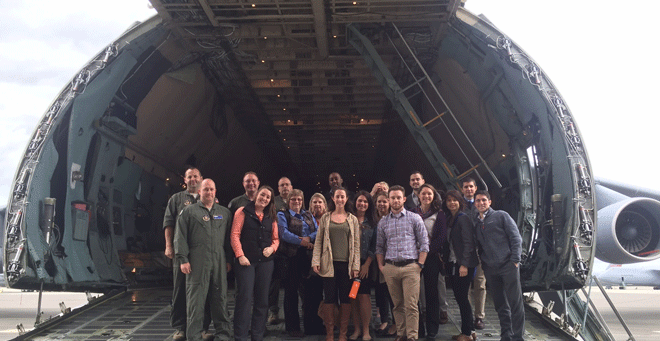 |
|
|
Students and faculty of the 2015 Veterans Health Clerkship are pictured in front of a C-5 transport plane during their visit to Westover Air Reserve Base on Nov. 7. |
Nine School of Medicine and two Graduate School of Nursing students were hosted by Westover Air Reserve Base on Saturday, Nov. 7, at the conclusion of a two-week study of veterans health care. They are members of UMass Medical School’s 2015 Population Health Clerkship, an interprofessional learning experience for future health care providers.
“It is important that our future physicians and nurse practitioners understand the unique concerns that a veteran may present with when seeking care,” said course founder and director Linda Cragin, instructor in family medicine & community health and director of the Massachusetts Area Health Education Center administered by Commonwealth Medicine. “Bringing our students to where veterans and active duty soldiers are reinforces the importance of asking patients about military service.”
Population health clerkships, a requirement for all medicine and nursing students, serve as introductions to public health concepts and to communities as units of care; the clerkship learning experience relies largely on direct community engagement. Veterans health students crisscrossed the state to experience firsthand the challenges Massachusetts veterans face in getting the health care they need, as well as the community and clinical resources available to them. In addition to the Westover Air Reserve Base, destinations included the Soldier’s Home in Holyoke; a military family support group in Concord; Veteran’s Inc. in Worcester; and the Veterans Health Administration Medical Center in Bedford.
“The most important thing I learned is that asking the question ‘Have you or someone close to you served in the U.S. military?’ opens the door to what to do next for the patient in front of you,” said medical student Christopher Androski. “The next step is to explore how that prior service affects their current life.”
For example, some Vietnam War veterans who came home to a country that did not actively support the cause and coped with their experiences on their own at the time, may be constantly reliving moments from the war that they never fully processed. Or in a scenario common for recent Iraq or Afghanistan war veterans, an individual who survived one or multiple improvised explosive device blasts, with little or no apparent outward physical damage, may nonetheless be suffering from traumatic brain injury.
It’s also important for health care providers to engage with veterans’ families whenever possible. “Family members are often a good resource to better understand the soldier’s situation,” said nursing student Rachel Fields. The clerkship visit with a family support group was instrumental in gaining this understanding.
Piloted by Cragin in 2012, the Veterans Health clerkship is now in its fourth year. Other Population Health Clerkships focus on the needs of other vulnerable groups, including poor families, adults with intellectual disabilities, adolescent girls and Worcester’s LGBT community.